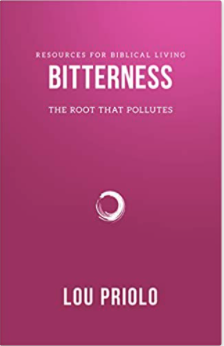Bitterness: The Root that Pollutes
Bitterness: The Root that Pollutes, written by Lou Priolo, is a helpful gospel-motivated resource for shepherding a heart through the difficulties of the elusive power and sway of bitterness.

The book is a mere 60 pages in length and contains personal questions at the back of each chapter, great for a small group or an individual who would like to take the material to a deeper level of application to the heart.
Lou Priolo drew the title of his book from Hebrews 12:15, “See to it that no one comes short of the grace of God, that no root of bitterness springing up causes trouble and by it many be defiled.”
Priolo describes bitterness in terms of cutting or pricking, that is, an internal, self-inflicting wound that is expressed through a resentful, unforgiving attitude that cuts and pricks others as well (page 6). He observes the description used by the Hebrew writer and tactfully states: “Roots have to be planted. So, let me ask you, ‘What do you suppose is the seed that when planted in the soil of our hearts sprouts into a root of bitterness?’” (page 7).
He offers to his readers this thought-provoking consideration: the seed of bitterness is a hurt. He writes that when the seed of hurt is dropped into the soil of the heart the person can either, “reach down and pluck up the seed by forgiving your offender, or you can begin to cultivate the seed by reviewing the hurt over and over again in your mind” (page 7).
Jesus told his disciples that the treasure of the heart (its fruit) characterizes the spiritual condition of the heart. Lou Priolo gives his readers an opportunity to assess the condition of their hearts by looking at some of the symptoms that accompany the heart of bitterness..
Consequently, after defining bitterness, he offers a number of evidences of bitterness. He draws these both from Scripture as well as his own counseling experiences.
Now, it is the antidote that is worth the price of the book. Lou Priolo grounds the solution in the gospel of Jesus Christ where he explores the nature of the forgiveness of God toward sinners.
Pastor Priolo makes the assertion that forgiveness is tremendously expensive. He writes (and this is provocative), “It costs the price of the offense that you forgive!” (page 14). He then explores the nature of forgiveness as that which is grounded in righteousness imputed to the account of the offender.
He notes that imputation is based upon the promise of God and anchored in his saving work in Jesus Christ. Well, I am not at liberty to divulge the wealth of this section, but the material Lou mines from the gospel is powerful and thought-provoking, particularly when he applies the promises of the gospel to the heart of bitterness and points a way forward to, in Priolo’s words, “impute forgiveness, much like Christ credited your heavenly account with His righteousness” (page 17).
Having grounded forgiveness in the gospel, Priolo focuses on the wealth of Scripture’s teaching regarding tending to the heart to cultivate a forgiving attitude and actions of service that (sometimes are offered up despite the bitter feelings) prepare the way for paving paths (character) of love.
More in Monthly Newsletter
May 1, 2024
The Christian Ethic of Joy and SufferingMay 1, 2024
Elders ReportMay 1, 2024
Deacons Report